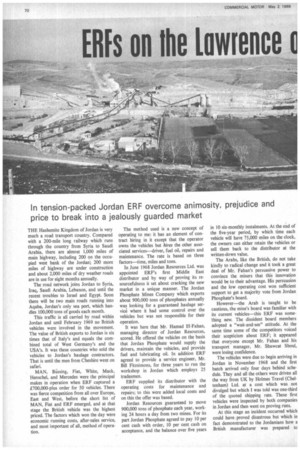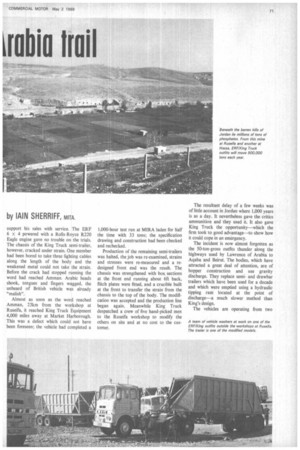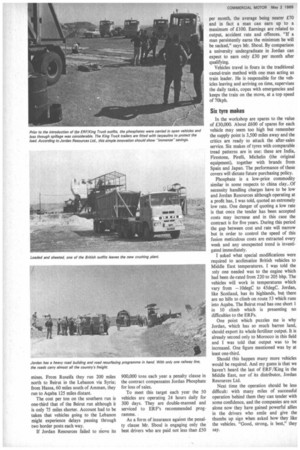ERFs on the Lawrence c Irobia troll
Page 72

Page 73

Page 74

If you've noticed an error in this article please click here to report it so we can fix it.
In tension-packed Jordan ERF overcome animosity, prejudice and price to break into a jealously guarded market by IAIN SHERRIFF, mirk
THE Hashemite Kingdom of Jordan is very much a road transport country. Compared with a 200-mile long railway which runs through the country from Syria to Saudi Arabia, there are almost 1,000 miles of main highway, including 200 on the occupied west bank of the Jordan; 200 more miles of highway are under construction and about 2,000 miles of dry weather roads are in use for eight months annually.
The road network joins Jordan to Syria, Iraq, Saudi Arabia, Lebanon, and until the recent troubles to Israel and Egypt. Soon there will be two main roads running into Aqaba, Jordan's only sea port, which handles 100,000 tons of goods each month.
This traffic is all carried by road within Jordan and until February 1969 no British vehicles were involved in the movement. The value of British exports to Jordan is six times that of Italy's and equals the combined total of West Germany's and the USA's. It was these countries who sold the vehicles to Jordan's haulage contractors. That is until the men from Cheshire went on safari.
MAN, Bussing, Fiat, White, Mack, Henschel, and Mercedes were the principal makes in operation when ERF captured a £700,000-plus order for 50 vehicles. There was fierce competition from all over Europe, East and West, before the short list of MAN, Fiat and ERF emerged, and at that stage the British vehicle was the highest priced. The factors which won the day were economic running costs, after-sales service, and most important of all, method of operation.
The method used is a new concept of operating to me: it has an element of contract hiring in it except that the operator owns the vehicles but hires the other associated services—driver, fuel oil, repairs and maintenance. The rate is based on three factors—time, miles and tons.
In June 1968 Jordan Resources Ltd. was appointed ERF's first Middle East distributor and by way of proving its resourcefulness it set about cracking the new market in a unique manner. The Jordan Phosphate Mines Company which exports about 900,000 tons of phosphates annually was looking for a guaranteed haulage service where it had some control over the vehicles but was not responsible for their operation.
It was here that Mr. Hamad El-Fahan, managing director of Jordan Resources, scored. He offered the vehicles on the basis that Jordan Phosphate would supply the drivers, maintain the vehicles, and provide fuel and lubricating oil. In addition ERF agreed to provide a service engineer, Mr. Bill Fitzsimons, for three years to run the workshop in Jordan which employs 25 tradesmen.
ERF supplied its distributor with the operating costs for maintenance and repairs; to this were added local costs and on this the offer was based.
Jordan Resources guaranteed to move 900,000 tons of phosphate each year, working 24 hours a day from two mines. For its part Jordan Phosphate agreed to pay 10 per cent cash with order, 10 per cent cash on acceptance, and the balance over five years in 10 six-monthly instalments. At the end of the five-year period, by which time each vehicle will have 75,000 miles on the clock, the owners can either retain the vehicles or sell them back to the distributor at the written-down value.
The Arabs, like the British, do not take kindly to radical change and it took a great deal of Mr. Fahan's persuasive power to convince the miners that this innovation would be to their advantage. His persuasion and the low operating cost won sufficient support to get a majority vote from Jordan Phosphate's board.
However—the Arab is taught to be cautious, the mine's board was familiar with its current vehicles—this ERF was something new. The dissident board members adopted a "wait-and-see" attitude. At the same time some of the competitors voiced their scepticism about ERF; it appeared that everyone except Mr. Fahan and his transport manager, Mr. Shawcat Sboul, were losing confidence.
The vehicles were due to begin arriving in Jordan in November 1968 and the first batch arrived only four days behind schedule. They and all the others were driven all the way from UK by Holmes Travel (Cheltenham) Ltd. at a cost which was not divulged but which I was told was one-third of the quoted shipping rate. These first vehicles were inspected by both companies in Jordan and then went on proving runs.
At this stage an incident occurred which could have proved disastrous but which in fact demonstrated to the Jordanians how a British manufacturer was prepared to support his sales with service. The ERF 6 X 4 powered with a Rolls-Royce R220 Eagle engine gave no trouble on the trials. The chassis of the King Truck semi-trailer, however, cracked under strain. One member had been bored to take three lighting cables along the length of the body and the weakened metal could not take the strain. Before the crack had stopped running the word had reached Amman. Arabic heads shook, tongues and fingers wagged, the unheard of British vehicle was already "malish".
Almost as soon as the word reached Amman, 23km from the workshop at Ruseifa. it reached King Truck Equipment 4,000 miles away at Market Harborough. This was a defect which could not have been foreseen: the vehicle had completed a 1,000-hour test run at MIRA laden for half the time with 33 tons: the specification drawing and construction had been checked and rechecked.
Production of the remaining semi-trailers was halted, the job was re-examined, strains and stresses were re-measured and a redesigned front end was the result. The chassis was strengthened with box sections at the front end running about 6ft back, flitch plates were fitted, and a crucible built at the front to transfer the strain from the chassis to the top of the body. The modification was accepted and the production line began again. Meanwhile King Truck despatched a crew of five hand-picked men to the Ruseifa workshop to modify the others on site and at no cost to the customer. The resultant delay of a few weeks was of little account in Jordan where 1,000 years is as a day. It nevertheless gave the critics ammunition and they used it. It also gave King Truck the opportunity—which the firm took to good advantage—to show how it could cope in an emergency.
The incident is now almost forgotten as the 50-ton-gross outfits thunder along the highways used by Lawrence of Arabia to Aqaba and Beirut. The bodies, which have attracted a great deal of attention, are of hopper construction and use gravity discharge. They replace semiand drawbar trailers which have been used for a decade and which were emptied using a hydraulic tipping ram located at the point of discharge—a much slower method than King's design.
The vehicles are operating from two per month, the average being nearer £70 and in fact a man can earn up to a maximum of £100. Earnings are related to output, accident rate and offences. "If a man persistently earns the minimum he will be sacked," says Mr. Sboul. By comparison a university undergraduate in Jordan can expect to earn only £30 per month after qualifying.
Vehicles travel in fours in the traditional camel-train method with one man acting as train leader. He is responsible for the vehicles leaving and arriving on time, supervises the daily tasks, copes with emergencies and keeps the train on the move, at a top speed of 70kph.
Six tyre makes
In the workshop are spares to the value of £30,000. About £600 of spares for each vehicle may seem too high but remember the supply point is 3,500 miles away and the critics are ready to attack the after-sales service. Six makes of tyres with comparable tread patterns are in use: these are India. Firestone, Pirelli, Michelin (the original equipment), together with brands from Spain and Japan. The performance of these covers will dictate future purchasing policy.
Phosphate is a low-price commodity similar in some respects to china clay.. Of necessity handling charges have to be low and Jordan Resources although operating at a profit has. I was told, quoted an extremely low rate. One danger of quoting a low rate is that once the tender has been accepted costs may increase and in this case the contract is for five years. During this period the gap between cost and rate will narrow but in order to control the speed of this fusion meticulous costs are extracted every week and any unexpected trend is investigated immediately.
I asked what special modifications were required to acclimatize British vehicles to Middle East temperatures. I was told the mily one needed was to the engine which had been de-rated from 220 to 205 bhp. The vehicles will work in temperatures which vary from —10degC to 45degC. Jordan, like Scotland, has its highlands, but there are no hills to climb on route 53 which runs into Aqaba. The Beirut road has one short I in 10 climb which is presenting no difficulties to the ERFs.
One point which puzzles me is why Jordan, which has so much barren land, should export its whole fertilizer output. It is already second only to Morocco in this field and I was told that output was to be increased. One figure mentioned was by at Least one-third.
Should this happen many more vehicles would be required. And my guess is that we haven't heard the last of ERF /King in the Middle East, nor of its distributor, Jordan Resources Ltd.
Next time the operation should be less difficult: with many miles of successful operation behind them they can tender with some confidence, and the companies are not alone now they have gained powerful allies in the drivers who smile and give the thumbs up sign when asked how they like the vehicles. "Good, strong, is best," they say.




















































































































































































































